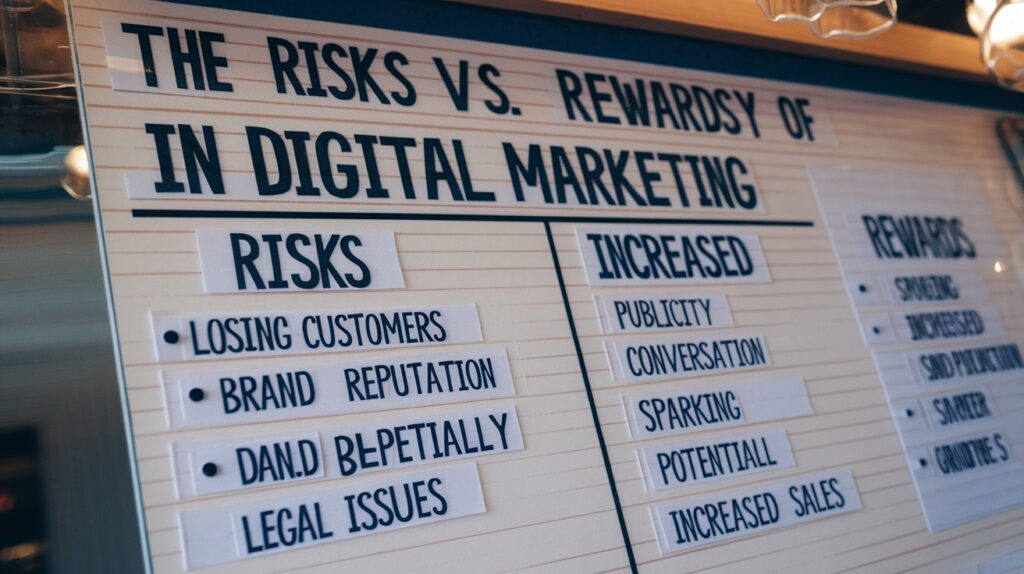In the current digital environment, social media has turned into a battlefield for disputes, both deliberate and inadvertent. So in this blog we have shown The Digital marketers Perspective on Social Media Controversy in 2025 .It has become commonplace for public figures, influencers, and brands to be at the center of contentious discussions. This blog examines how controversies impact digital marketing and whether they should be used to further a brand’s growth.
However, from the standpoint of digital marketing, is controversy a good tactic or a risk that could damage a brand’s reputation?
1. The Virality of Controversy
How Brands Leverage Controversy for Engagement
Controversy has been shown to be one of the most effective ways to grab an audience’s attention, and the digital world thrives on engagement. Some companies are experts at strategically leveraging controversy to increase their visibility. Examples include:
• Balenciaga: The company’s unorthodox advertising has frequently provoked controversy. Some criticized them for being tone-deaf, while others praised their creative marketing strategies.
• Tesla and Elon Musk: Whether it’s Tesla’s technological innovations or Musk’s uncensored tweets, Musk regularly sparks conversations on Twitter, making Tesla a trending topic.
• Public figures and influencers: Since controversy encourages interaction, many influencers purposefully produce divisive content to acquire traction.
Why Does This Work?
Social media algorithms favor high-engagement posts, meaning controversial content often gets amplified. When people debate, share, and comment on a post, it gains more visibility, leading to increased brand awareness. However, brands need to tread carefully, as poorly managed controversies can damage reputation beyond repair.
Deeper Analysis:
Controversy works well because it triggers an emotional response. Humans are naturally drawn to conflict, whether they agree or disagree with the issue at hand. Marketers often exploit this by designing campaigns that spark curiosity, excitement, or even outrage. For example, the infamous Gillette ad that tackled toxic masculinity divided audiences but kept the brand in the spotlight for weeks. Controversy also has the power to reshape brand perception. Some brands use it to reposition themselves in the market. A strong, bold stance on a relevant social issue can make a company appear progressive and forward-thinking.
2. Digital Marketers Perspective on Social Media Controversy and its Risks vs. Rewards :

Benefits:
1. Enhanced Engagement: Discussions, shares, and comments increase when controversy ignites dialogue.
2. Brand Awareness: Visibility is increased even by unfavorable press.
3. Loyal Fan Base: A devoted community can be formed by taking a strong stand on a subject.
4. SEO Boost: Brands can rank higher on Google thanks to the high search volume generated by controversial content.
Risks include:
- Reputational harm: poorly handled controversy can result in boycotts and public outrage.
- Loss of Customers: You risk alienating certain segments of your audience by expressing polarizing views.
- Quick Profits vs. Long-Term Impact: Although controversy can garner attention in the short term, if it is managed poorly, it can also have long-term effects.
- Negative Press Coverage: A controversy can be magnified by the media, which makes damage control even more difficult.
Digital Marketer’s Insight:
Brands need to consider if getting involved in controversy is consistent with their values and long-term objectives. Plans for crisis management must exist if the strategy calls for controversy. Never use controversy carelessly; rather, incorporate it into a well-planned strategy that includes backup plans. For instance, companies with a track record of supporting social causes, such as Ben & Jerry's, are commended when they do so. However, audiences may view a brand as opportunistic or inauthentic when it abruptly and unpredictably jumps on a contentious issue.
3. The Psychology Behind Online Outrage Why Do People Engage More with Controversial Content?
- Emotional Response: Content that evokes strong emotions such as shock, anger, or passion causes people to react strongly.
- Tribalism: People on social media frequently take sides and defend them, which feeds arguments.
- Sense of Justice: When people believe something to be unfair or immoral, they often feel obligated to voice their opinions.
- Algorithmic Amplification: Social media sites prioritize content that is highly engaging, frequently giving priority to content that is controversial.
Digital marketers can create content that maximizes engagement while minimizing negative effects by having a solid understanding of this psychology. How Social Media Platforms Amplify Controversy
Content that keeps users interested is given priority by algorithms. Because it elicits strong emotions and high levels of engagement, controversial content has a greater chance of being promoted to a larger audience. To get attention, digital marketers frequently employ attention-grabbing headlines, startling data, or divisive imagery.
For instance, because they get the most interaction, politically charged or sensational subjects are frequently featured in Twitter’s trending section. Companies that recognize this trend can capitalize on controversy to keep their content current.
4. Case Studies: Controversies That Helped vs. Those That Hurt

Global Cases:
- Nike & Colin Kaepernick: Nike’s controversial campaign featuring Kaepernick led to divided opinions, but it strengthened brand loyalty among its target audience, increasing sales.
- Pepsi & Kendall Jenner: Pepsi’s ad featuring Jenner attempting to solve social unrest with a soda was widely criticized, leading to its removal and a public apology.
Recent Indian Cases:
- India’s Got Talent Controversy: The recent backlash against the show raised concerns about ethical content curation. The controversy gained significant traction, with viewers debating online whether reality TV exploits emotions for ratings.
- MahaKumbh Controversy: The recent debates surrounding MahaKumbh regarding its organization, environmental concerns, and political involvement sparked massive discussions across digital platforms.
Lessons for Digital Marketers:
To prevent backlash, brands must make sure their messaging reflects the values of their target audience.
Brands are always looking for new and creative ways to draw in customers, boost engagement, and bolster their market presence in the fast-paced world of digital marketing. Using controversy to start discussions and create buzz is one tactic that has become popular. However, when using such strategies, ethical considerations must come first. Brands need to evaluate if utilizing controversy is consistent with their values, upholds their credibility, and builds audience trust over the long run. Misuse of controversy can backfire, resulting in financial consequences, a decline in consumer trust, and harm to one’s reputation. This article investigates the ethical use of controversy by brands in digital marketing.
The Power of Controversy in Marketing
For a long time, controversy has been a useful marketing tool. It draws attention right away, sparks conversations, and has the potential to go viral. People are drawn to divisive subjects by nature, and brands can gain more exposure by participating in these conversations. Brands trying to stand out find controversial marketing campaigns appealing because they frequently cut through the deluge of digital content.
For instance, there was a lot of discussion about Nike’s 2018 advertising campaign that featured Colin Kaepernick, the former NFL quarterback who protested racial injustice by kneeling during the playing of the national anthem. Although some customers were turned off by the campaign, those who agreed with Kaepernick’s position became more devoted to the brand. Following the campaign, Nike’s sales rose dramatically, proving that controversy can be constructive when it is in line with brand values.
5. Ethical Considerations in Controversial Marketing

While controversy can be an effective marketing strategy, brands must carefully navigate ethical concerns. Below are some key factors brands should consider before engaging in controversial marketing:
- Does the Controversy Serve a Meaningful Purpose?
Brands ought to assess whether their involvement in a contentious matter fulfills a significant function or if it is only a publicity stunt. It can be interpreted as opportunistic and dishonest to take advantage of delicate subjects without having a sincere dedication to the cause. A brand should support impacted communities, promote constructive change, or engage in meaningful dialogue when it chooses to address a contentious issue. Ben & Jerry’s, for example, has continuously adopted strong positions on social justice issues like racial equality, LGBTQ+ rights, and climate change. Their involvement in contentious issues seems genuine rather than exploitative because their activism is consistent with the core values of their brand.
- Is the Controversy Consistent with the Brand’s Identity?
The way a brand handles controversy should be consistent with its values, mission, and overall identity. Customers can quickly spot inauthenticity, so if a brand jumps into a contentious issue without any prior involvement, it may come across as a marketing gimmick rather than a sincere position.
For instance, the outdoor clothing company Patagonia is well-known for its dedication to environmental sustainability. Their “Don’t Buy This Jacket” campaign, which aimed to raise awareness of environmental issues and responsible consumption, aligned with their brand identity and strengthened their reputation. But if a fast-fashion company with a track record of using unsustainable methods were to start a similar campaign, it would probably come under fire for being hypocritical.
- How Will the Audience Perceive This Stance?
When using controversial marketing, it is essential to comprehend the viewpoint of the target audience. To determine how their audience will respond, brands should carry out in-depth research. A contentious position can increase brand loyalty if it is consistent with the values of the brand’s core customers. However, it might lead to a decline in sales and a bad reputation for the brand if it alienates a sizable section of the clientele. Additionally, brands need to have a crisis management plan in place and be ready for any backlash. Public response is heightened by social media, and a poorly received campaign can rapidly worsen. Risks can be reduced by keeping an eye on audience sentiment and being prepared to have frank conversations.
The Risks of Misusing Controversy
While controversial marketing can generate attention, misusing it can lead to severe consequences. Some risks associated with unethical controversy-driven marketing include:
- Loss of Credibility: A brand runs the risk of losing credibility if it gets involved in controversy purely for publicity purposes without showing any real commitment. Customers appreciate genuineness and are able to spot performative activism easily.
- Boycotts and Public Backlash: A badly run, contentious campaign may result in boycotts, bad press, and indignation on social media. Due to strong criticism, Pepsi’s 2017 commercial with Kendall Jenner that trivialized the Black Lives Matter movement was removed soon after it was released.
- Legal and Financial Repercussions: Certain contentious marketing initiatives may result in fines, legal problems, or the termination of business relationships. Brands need to make sure they abide by ethical standards and advertising laws.
Best Practices for Ethical Controversial Marketing
A brand must act morally and responsibly if it chooses to get involved in controversy. The following are recommended practices to adhere to:
- Assure Authenticity: A brand’s position on a contentious topic ought to be genuine and supported by evidence. Sincerity can be strengthened by working with advocacy organizations, enforcing internal policies, and supporting pertinent causes.
- Communicate Transparently: Brands should explain their stance and the rationale behind it in detail. Clear communication reduces misunderstandings and promotes trust.
- Be Ready for Diverse Views: A brand’s position on a contentious issue may not be shared by everyone. Instead of brushing off criticism, brands should be ready for dissenting viewpoints and have civil conversations.
- Avoid Exploitative Tactics: Brand reputation can be harmed by using controversy solely as a marketing ploy. Brands should make sure their involvement in a subject is purposeful rather than merely for the sake of shock value.
- Keep an eye on and adjust: Public opinion can change quickly, and digital marketing is dynamic. Brands should keep an eye on audience responses and be prepared to modify their strategy as necessary.
6. Crisis Management: Handling Social Media Backlash
In the digital age, social media serves as a powerful platform for brands to connect with their audience, promote products, and engage in meaningful conversations. However, it also presents risks, as even a single misstep can escalate into a full-blown crisis. Social media backlash can damage a brand’s reputation, impact customer trust, and lead to financial losses. Effective crisis management strategies are essential to mitigate damage and restore credibility. Here’s a comprehensive approach to handling social media backlash:
- Monitor Conversations
One of the key aspects of crisis management is proactive monitoring. Brands should consistently track online conversations, customer feedback, and brand mentions to identify potential issues before they escalate. Several digital marketing service websites and tools, such as Hootsuite, Brandwatch, and Sprout Social, offer sentiment analysis and real-time alerts, helping businesses stay informed about how their brand is being perceived.
By closely monitoring discussions, companies can gauge public sentiment, detect emerging issues, and address concerns in their early stages. Keeping a pulse on customer reactions enables brands to take swift action before the situation spirals out of control.
- Acknowledge and Apologize (If Needed)
When faced with social media backlash, brands must acknowledge the issue rather than ignore or delete critical comments. Silence or defensive responses can further fuel public outrage and create an impression of irresponsibility.
If the backlash is due to a genuine mistake or misunderstanding, issuing a sincere apology can help diffuse the situation. A well-crafted apology should:
- Acknowledge the concern
- Take responsibility (if applicable)
- Show empathy
- Reassure stakeholders that corrective actions are being taken
For instance, if a company releases an insensitive advertisement that offends a certain group, a public apology along with tangible steps to rectify the mistake can demonstrate accountability. Customers appreciate transparency and honesty, and a thoughtful response can help rebuild trust.
- Clarify the Brand’s Standpoint
In some cases, social media backlash arises from misinterpretations or false claims rather than actual mistakes. In such situations, brands must clarify their position without appearing defensive or dismissive.
A carefully worded response should:
- Provide factual information
- Dispel misinformation
- Reinforce company values
It’s important to maintain a professional and respectful tone. Engaging in online arguments or retaliatory comments can backfire and worsen the situation. Instead, brands should focus on educating their audience and steering the conversation in a positive direction.
- Take Corrective Actions
If the controversy stems from a mistake or misstep, words alone won’t suffice—corrective actions must follow. Customers expect brands to be accountable and proactive in resolving issues. Some key steps include:
- Implementing policy changes
- Revising or removing controversial content
- Offering compensation (if necessary)
- Engaging with affected customers to make amends
For example, if a company faces backlash over poor customer service, they can address the issue by retraining employees, improving response times, and offering discounts to affected customers. Actions speak louder than words, and taking measurable steps to resolve the problem demonstrates a genuine commitment to improvement.
- Engage with the Audience
During a crisis, open communication with the audience is crucial. Brands should use social media platforms to keep customers informed about the steps being taken to resolve the issue. Regular updates help reassure customers that the brand is actively addressing concerns rather than brushing them aside.
Responding to comments and messages in a timely and respectful manner fosters positive engagement. It’s also beneficial to leverage influencers, brand advocates, or loyal customers to share positive experiences and counteract negative sentiment.
- Learn from the Crisis
Every crisis presents an opportunity for growth. Once the backlash subsides, brands should conduct a thorough analysis to understand what went wrong and how similar situations can be prevented in the future. Key aspects to evaluate include:
- The root cause of the crisis
- The effectiveness of the response strategy
- Lessons learned
- Adjustments to policies, marketing strategies, or communication practices
Conducting post-crisis reviews and training employees on best practices can help businesses emerge stronger and more resilient against future challenges.

Conclusion:
Managing backlash on social media calls for a methodical and strategic approach. Brands can successfully navigate crises and protect their reputation by keeping an eye on conversations, acknowledging concerns, elaborating on positions, taking corrective action, interacting with the audience, and learning from previous incidents. Effective crisis management is based on openness, responsibility, and sincere care for clients.
Businesses can use obstacles as chances to improve their reputation and fortify their bonds with clients if they have the proper plan in place. Social media controversy can have both positive and negative effects. Digital marketers need to carefully consider when and how to discuss contentious issues.
Controversy can be a potent marketing tool if it is handled well and is consistent with brand values. However, controversies that are unethical or poorly thought out can cause irreparable harm. Digital marketers can effectively and sustainably handle social media controversies by remaining knowledgeable and moral.

